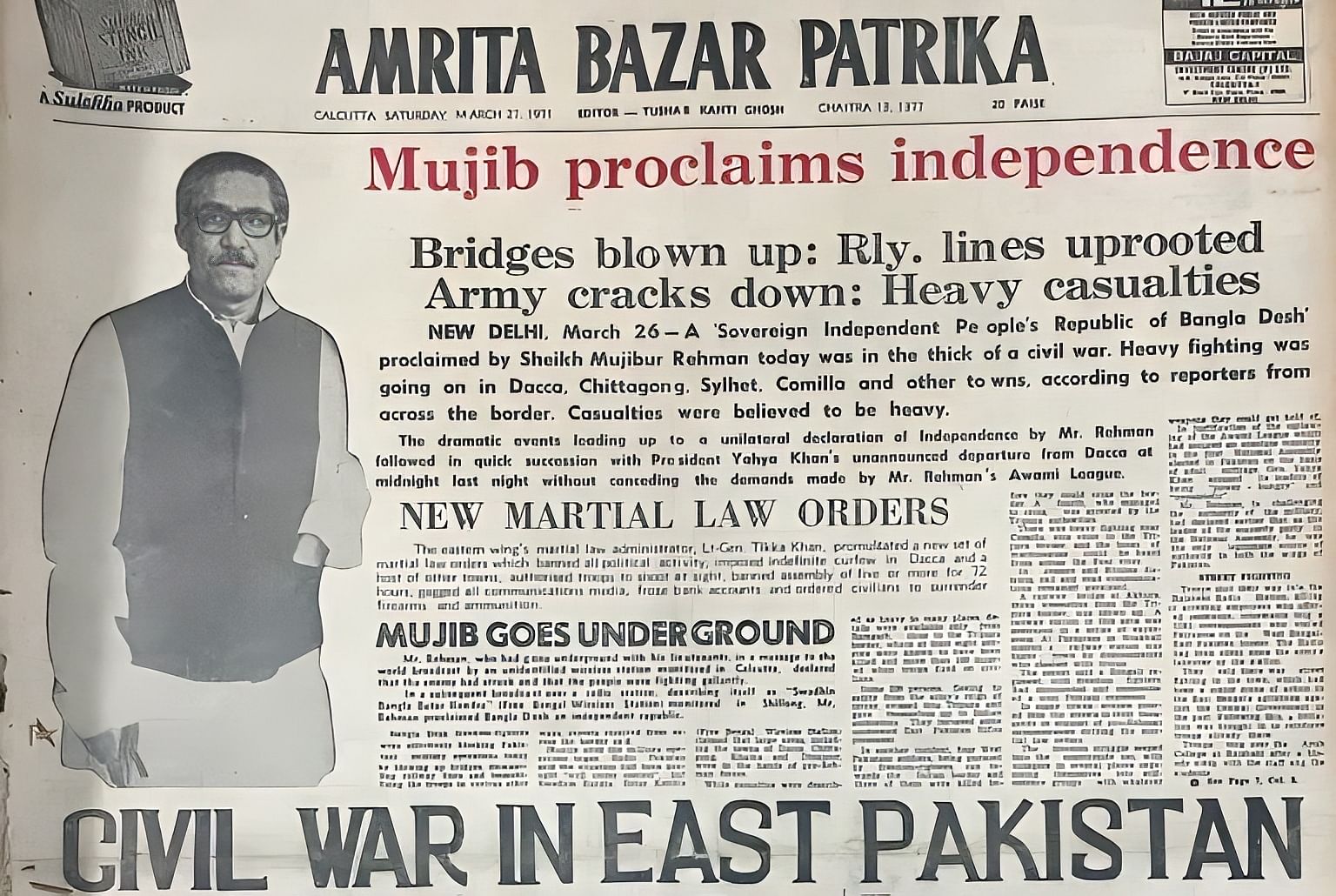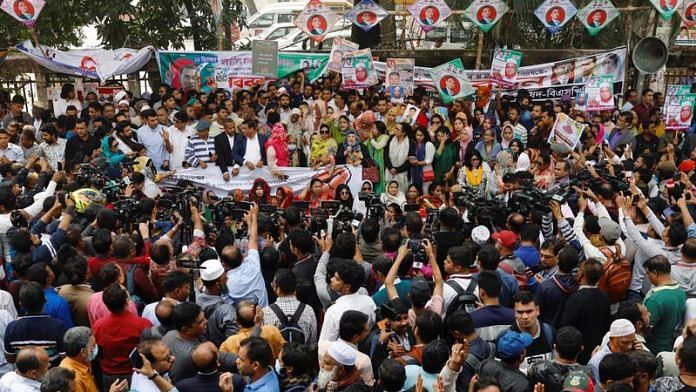There are two ideas of Bangladesh that are fundamentally at odds with each other. After the general election on 7 January 2024, one of these ideas will take a back seat for the next five years.
The first idea predates the birth of Bangladesh in 1971, when the same landmass was known as East Pakistan. Looked at with disdain and disinterest by West Pakistan, the Bengali-speaking Pakistan rose in protest, demanding more political autonomy and rejecting Urdu’s dominance.
What happened next is recorded history—targeted killings, mass rapes, and a clinical attempt to drain out any sense of Bengali-ness that contained within itself a more syncretic culture bound together by the love for the Bangla language. Midwifed by India, when East Pakistan cut its umbilical cord with West Pakistan and became Bangladesh, there was this sense of a common destiny for the Muslims and Hindus of Bangladesh, forged stronger by the bloody battle for a hard-fought independence and an idea of a country that may be Muslim-majority but has an equal space for Hindus and other minorities. It helped that the founding figure of this new country was Bangabandhu Sheikh Mujibur Rahman, who famously said that Bangladesh doesn’t belong to Hindus or Muslims but to anyone who calls the country her own.
Looking back, it hasn’t really gone according to plan. Bangabandhu was assassinated along with most of his family members barely four years after the birth of Bangladesh by a section of his own army, and the ensuing politics of the country often took Bangladesh far away from the stated goals of the Liberation War.
How much of East Pakistan lives on in Bangladesh today?
Also read: Is the US fanning an ‘Arab Spring’ flame in poll-bound Bangladesh?
Bangabandhu, who?
If you were 20 years old when the 1971 Liberation War was fought, you would be 72 today and may be too disillusioned with the present to hold on to the struggles of the past. If you reach the voting age in January 2024, you may not even know what those struggles of the past were.
It took a biopic of Bangabandhu, directed by Indian filmmaker Shyam Benegal and jointly produced by both India and Bangladesh, to remind the country of its origin story and its dream of a syncretic culture forged by a common language. Mujib: The Making of a Nation became a hit in Bangladesh, but many of the values that Bangabandhu stood for seem to be lost to much of Bangladesh’s population today.

What else explains the popularity of an Islamist political party like the Jamaat-e-Islami in modern-day Bangladesh that, in its earlier avatar as Jamaat-e-Islami Pakistan, opposed the very independence of Bangladesh? It is recorded history that in the 1971 war, the Jamaat’s cadre joined hands with the Pakistan Army in mass killings and rapes in East Pakistan. Though the Supreme Court has barred the Jamaat from participating in the 7 January polls, the party’s cadre has been out on the streets demanding the dismissal of the Sheikh Hasina government and the introduction of Sharia laws in place of “man-made laws”.
In an interview to ThePrint, Bangladesh home minister Asaduzzaman Khan had said: “Jamaat shibir (Jamaat camp) is opposed to the very independence of Bangladesh. They gave birth to the Razakars and the Albadr Bahini (a paramilitary force composed mainly of Bihari Muslims which operated in East Pakistan during the Bangladesh liberation war, under the patronage of the Pakistani government). It is they who targeted and killed the intellectuals of Bangladesh.”
And yet, when the Jamaat’s vice-chairman and former MP Delwar Hossain Sayeedi died on 14 August 2023, incidentally on Pakistan’s Independence Day, while in prison outside Dhaka, there was an outpouring of public grief. More than 50,000 people attended his funeral and the police had to break up violent protests against the government. Sayeedi was serving life sentence for crimes committed during Bangladesh’s war for independence, which included murder, rape and persecution of Hindus.
If Bangladesh mourns the death of a war criminal that opposed its birth, did it ever let go of the past?
When the Jamaat through Bangladesh Nationalist Party (BNP) came to power in Bangladesh in 2001, the violence against minorities tore up the secular fabric of the nation. It is the same Jamaat that has now publicly said that they want Sharia laws in Bangladesh to replace “man-made laws”.
Also read: Smart Bangladesh or Sharia — For Hindus, it’s Hasina or an abyss this election
If not Hasina, what?
For the last 15 years that Sheikh Hasina has been in power, Bangladesh has seen unprecedented growth, infrastructural development and technological progress. All this has been tempered by allegations of syndicate raj, curbing of free speech, and violent crackdown on political opposition. The opposition BNP has boycotted the 7 January election demanding that Hasina should step down and a caretaker government be put in place. But the question before Bangladesh is not ‘if not Hasina, who’. It is: if not Hasina, what?
Will the struggles of 1971 that led to the formation of a secular Bangladesh get lost again? Bangladeshi academic Dr Sharin Shajahan Naomi, who is now postdoctoral fellow at Krea University, says Hindus in Bangladesh have always shown political allegiance to Hasina’s Awami League and have had to bear the brunt every time Awami League lost. Naomi said this raises the question if there will be any future for Hindus in Bangladesh if Awami League loses and the idea of 1971 gets defeated.
“I grew up with the spirit of 1971. Perhaps that is why I never saw Bangladeshi Hindus as the other. But in today’s Bangladesh, I do see a sense of 1947 returning as political opposition to Sheikh Hasina. It would be naïve to say only BNP and Jamaat are attacking Hindus or the idea of secularism. Anti-secularist forces have become heterogeneous in nature,” Naomi told ThePrint. She said the 1947 idea of an Islamic East Bengal was preached only by the orthodox Islamic groups and their political representatives. Now, intellectuals, activists and even some Leftist politicians hark back to 1947 and discard 1971.
The results of the 7 January election may not end this debate.
Deep Halder is a writer and journalist. He tweets @deepscribble. Views are personal.
(Edited by Prashant)



